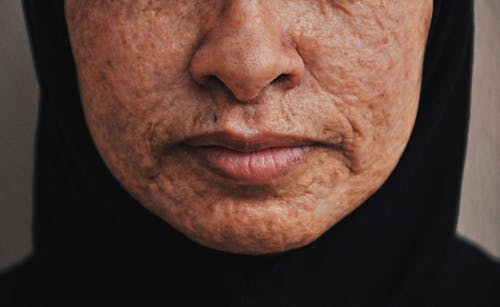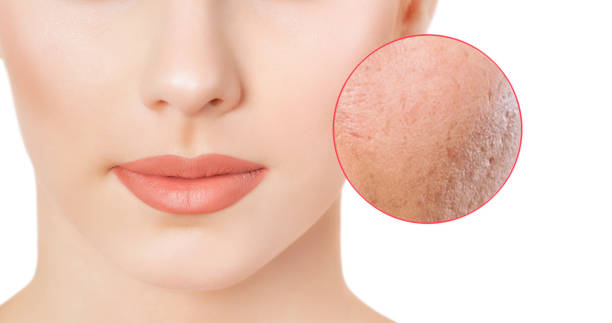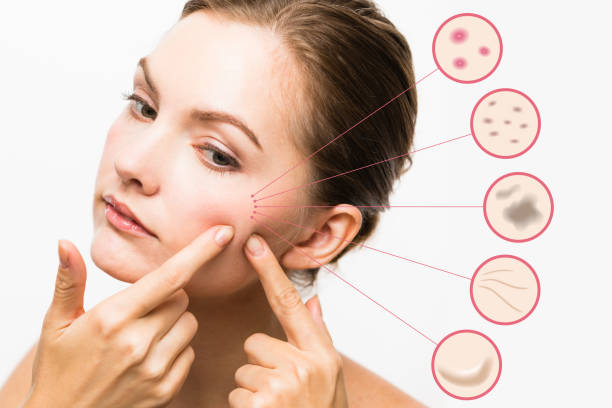If acne scars bother you, safe and effective treatments are available.

Treatments include
- laser treatments,
- Minor skin surgeries
- Chemical peels
- Microneedling
- Threads & fillers.
Most of these are office based procedures
.But before getting treatment for acne scars, it is important to clear your acne and control your new acne breakouts .
To obtain the best results, a dermatologist first examines your skin. Based on the type of scars , he/she devises a treatment plan individualised for your problems
Who is likely to get acne scars?
Some people are more likely to see scars when their acne clears. The risk increases when a person:
- Has swollen, reddish, and painful) acne
since these tend to penetrate deep into the skin, which damages the skin. - Delays or does not treat inflammatory acne
The longer the delay , the greater the risk of scarring. - Picks, squeezes, or pops acne
This increases inflammation, which increases the risk of scarring. - Has a blood relative who developed acne scars
Genes play a large role.
It is, however, possible to prevent acne scars with effective acne treatment.
.
What causes acne scars?
If pimples breakouts penetrate the skin deeply, they damage the skin and the tissue beneath it. The body tries to repair this damage. During the healing process, the body produces collagen—a substance that gives the skin support. If the body produces too little or too much collagen, you will see a scar.
The type of scar depends on how much collagen your body makes.
Depressed acne scars: If the body produces too little collagen, depressions or pits form as the skin heals.
Raised acne scars: Sometimes the body produces too much collagen as it tries to heal the skin and underlying tissue. This too has a genetic predisposition
Sometimes ,Even when we do our best to prevent acne scars, some people scar. There are many treatment options, which can significantly diminish depressed and raised acne scars.
How do dermatologists treat acne scars?

Your dermatologist will create a treatment plan tailored to your needs. In creating this plan, your dermatologist will consider many things, including scar types and where the scars appear on your body. If you have taken isotretinoin to treat acne, tell your dermatologist before treatment for acne scars begins.
For getting best results, your dermatologist may combine 2 or more procedures . For example,laser therapy can be combined with a type of acne scar surgery called “subcision” may be necessary to give you the results you want.
Depressed acne scars: Many effective treatments
Best results often come from using two or more treatments. The treatments that a dermatologist may use to treat depressed acne scars include the following.Most procedures can safely be perfor in a medical office.
Acne scar surgery
To perform acne scar surgery, a dermatologist may lift the scar, bringing the scar closer to the surface of the skin & making it less noticeable or breaking up scar tissue. Patients remain awake but numb so that they do not feel pain.
Best for: Treating a few depressed scars.
Resurfacing procedures
When a patient wants to diminish the appearance of widespread acne scarring, a dermatologist may recommend a resurfacing procedure. Resurfacing removes layers of skin, which allows the body to produce new skin cells.
Dermatologists use the following resurfacing procedures to treat depressed acne scars:
- Laser skin resurfacing
- Microneedling Radiofrequency
- Chemical peeling
- Dermabrasion
- Microdermabrasion (not same as home kits)
- Microneedling
Resurfacing works well for treating acne scars that are nearly flat (not too deep). Even dermabrasion, which removes the top layers of skin and some of the middle layers, cannot effectively treat deep acne scars so they are .Best for: Depressed acne scars that are not deep . Deep scars often require skin surgery and resurfacing.
Fillers
Dermatologists use fillers to effectively plump depressed acne scars. A dermatologist may fill acne scars with collagen, the patient’s own fat, or another substance. Many fillers give us temporary results, which last between 6 and 18 months. Some fillers are permanent.
Both temporary and permanent fillers have unique pros and cons. If this is a treatment option for you, be sure to ask your dermatologist about the pros and cons of the recommended filler.
Skin tightening
This is a newer treatment and tends to be more affordable. This treatment is safe for all skin colors.
A technology called radiofrequency is used to tighten the skin. As the skin tightens, depressed acne scars become less noticeable.
But Radiofrequency requires repeat appointments. Most patients return once a month for four months.
Radiofrequency treatments require some at-home care. For at least one week after each treatment, you will need to apply sunscreen every morning and a moisturizing cream at night. Dermatologists recommend wearing a sunscreen that offers UVA/UVB protection, an SPF of 30 or greater, and water resistance.
Best for: Depressed acne scars. Sometimes, skin tightening effectively treats deep icepick and boxcar scars.
Collagen-induction therapy
Also known as “needling” or “micro-needling,” this treatment encourages your body to make more collagen. Here a sterile, handheld needle-studded roller across the depressed acne scars. This punctures your skin. As your skin heals, it produces collagen. Most patients require between three and six treatments and return every two to six weeks for a treatment.
After each treatment, you may have some swelling and possibly bruising. These side effects usually clear within four to five days.
Best for: Widespread depressed acne scars. Not a treatment for raised acne scars, which form when the body produces too much collagen.
Electrodesiccation
Used for boxcar acne scars. Electrodesiccation by itself is not an effective treatment for acne scars.
Raised acne scars: Treatment can ease pain, diminish scars
Other treatments that a dermatologist may use to treat raised acne scars follow.
Injections
Your doctor may recommend injecting medicine directly into the scars. Many patients receive injections of corticosteroids. A chemotherapy medicine known as fluorouracil (5-FU) can also be effective in treating raised acne scars.
Acne scar surgery
Dermatologists perform acne scar surgery to reduce raised acne scars. This surgery can be performed in a dermatologist’s office.
To obtain the best results, acne scar surgery is often followed by another treatment.
Acne scar surgery, followed by injections
After surgery, dermatologists often treat raised scars with injections of corticosteroids, 5-FU, or interferon. Combining acne scar surgery with these shots remains one of the most effective treatments for raised scars. Most patients receive injections once a month for a few months.
Acne scar surgery, followed by radiation
Studies show that radiation can prevent raised scars from returning after acne scar surgery. Due to the potential for radiation treatments to cause problems years or decades later, some doctors do not recommend radiation treatment.
Best for: Raised scars that need stronger treatment than injections alone can provide
Laser therapy
Lasers and other light treatments can treat raised scars safely and effectively. Treatment with a pulsed dye laser (PDL) can help reduce the itch and pain, diminish color, and flatten a raised scar. For people with lighter skin, intense pulsed light (IPL) also may be a treatment option.
Best for: All types of acne scars
Cryosurgery
This treatment freezes the scar tissue. Freezing the tissue causes it to die and gradually fall off. The main drawback is that cryotherapy can cause permanent light spots to form on the treated skin.
Best for: It can effectively diminish raised scars in people who have lighter skin. However, cryosurgery is not recommended for people who have skin of color.
Scar creams, gels, and silicone dressings
Silicone dressings and bandages can be especially helpful. Although no one knows exactly how these work, one possibility is that silicone helps hydrate the skin. This may reduce the itch and pain as well as make the skin more flexible.
To be effective, these products must be used continuously.
Best for: Reducing scar size and discomfort. None is likely to eliminate a raised scar.
What outcome can a person with acne scars expect?
Dermatologists and dermatologic surgeons perform these procedures frequently, so they have the skills and experience needed to perform these procedures safely and effectively.
While dermatologists offer safe and effective treatment for acne scars, there may be a better solution: prevention !



Great content! Keep up the good work!